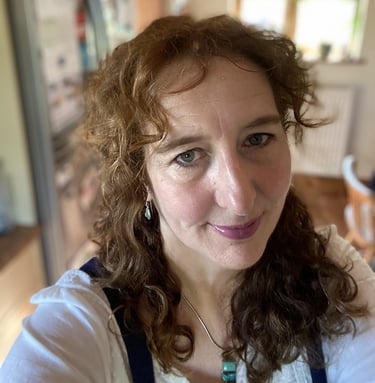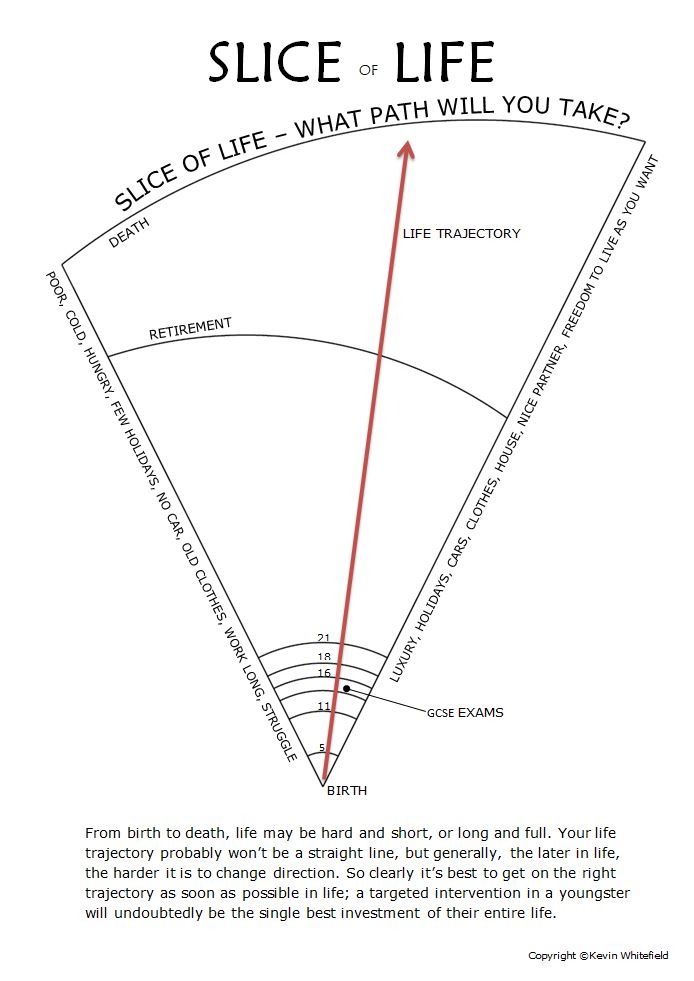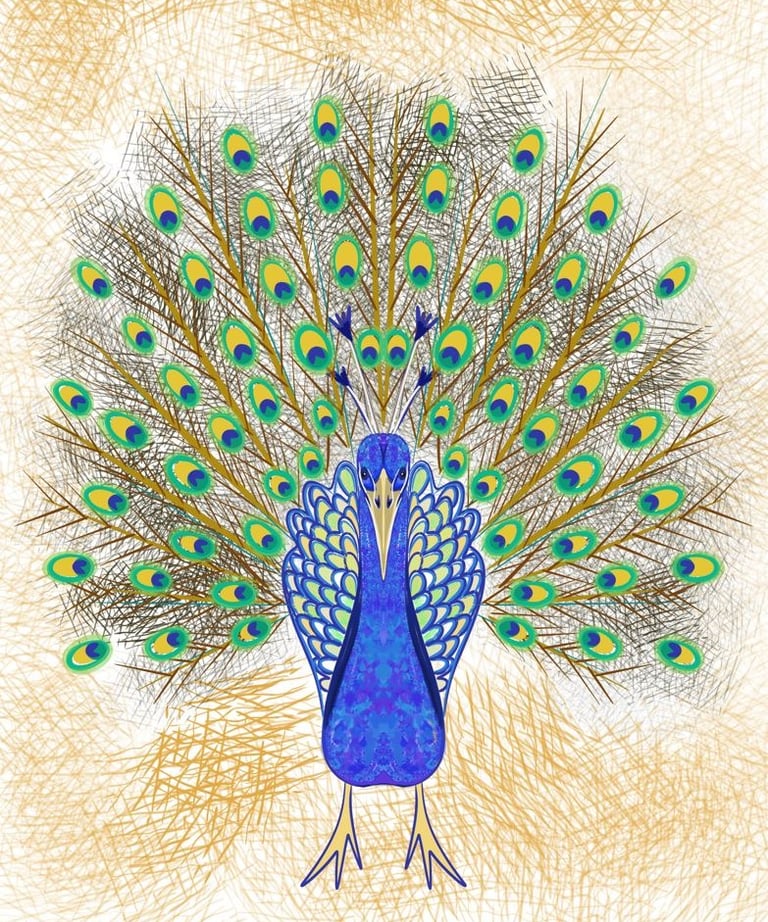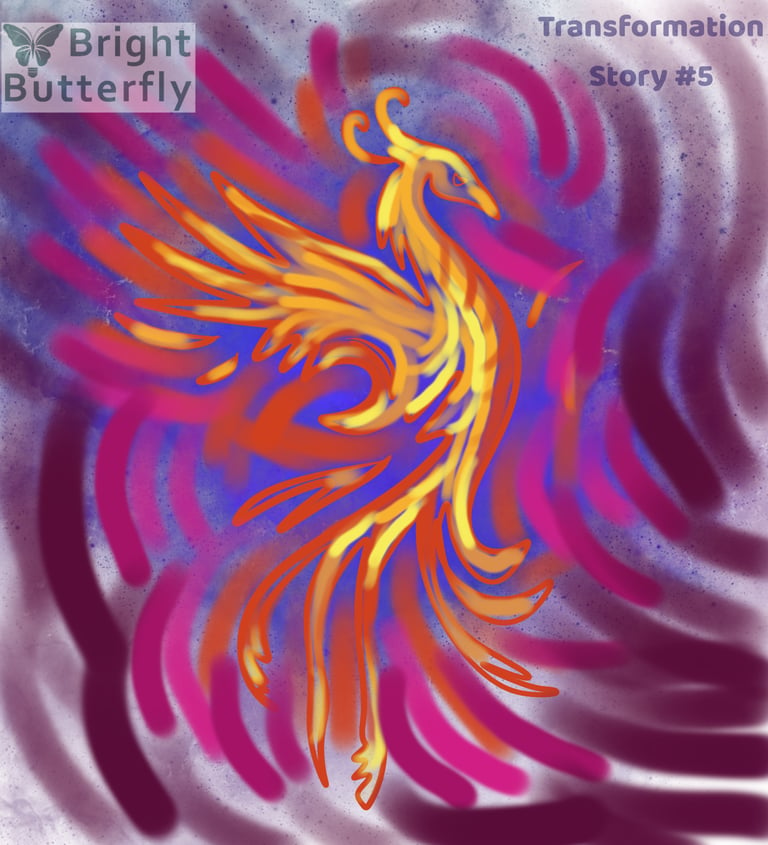Here Alison will recount stories and articles about transformations that can affect the course of your life, or that of your child. To have the life you want will depend on your actions, but sometimes you can benefit from an external intervention to nudge you along a better path, to realise your aspirations for a better life.
Transformation Stories


Transformation Story 1 - Slice of Life
It’s always very difficult for children and young people to see their life and what is happening right now, in context. Obviously, for very young children it can be beyond their scope. However, I do believe it is important to start conversations with children and young people about where they are now and how this fits into their future.
This transformation story raises a discussion about several things. What aspirations do you have? What would you like your life to be? What can affect the path of your life? How does Education fit in to this? How do we take responsibility for this?
The ‘slice of life’ gives a glimpse of timescales, how relatively short a period it is, that we are at school, compared to the rest of our lives. How working life and retirement are balanced and how do we get the life we want? This can be interpreted in many ways and everybody’s life is different and unique, of course, but the message is clear, take control of your life. You can determine your path.
I’ve worked with many children that have faced significant challenges and no one is pretending choosing a path and succeeding is easy, especially when the odds can be stacked against you, but empowerment begins by knowing something about where you might be going.


Transformation Story 2 - Confidence
On this, Children’s Mental Health Week (5th to 11th February), there are so many aspects to discuss, so many things that impact on the mental health of children and young people. The question of how we can support children to build self-confidence is one key area.
Confidence is that elusive quality that we wish we could give to our children in bucket- loads, but we know is only hard won through what mainly seems like a process of hard knocks and the occasional win. This leads me to the other essential ingredient for self-esteem; resilience. Unfortunately, in recent years in the aftermath of Covid, it seems grit and determination to succeed is in short supply in our schools.
We need to build up our children, through positive talk, unpacking, naming and validating their experiences, and showing them their value by giving unconditional positive regard. By adopting this kindness principle and approach, teaching them that they ‘can,’ in chunking learning and small steps, we can build that string of positive experiences and successes. Here is where resilience and confidence can slowly grow into self-belief.
I have often told my own children that if there was one thing I would tell my younger self, it would be to have confidence; that I’m ok as I am and have a lot to offer. It’s a truly transformational thing, which for me, only came with age. It would be great for Education to put in all the small meaningful steps with and for children, so that confidence and youth thrive together.


Transformation Story 3 - Reframing
How often do we acknowledge each day how important it is to think positively, and how often do we ask others to do it? In education we’re constantly asking for it from children and young people; ‘can do’ attitudes, growth mindset, solution-focused. These are all so valuable and if adopted, truly transformational. What if you can’t do it? What if your sense of self worth is so low, that as much as you want to, you can’t manifest or allow or enable yourself to go there. As with many other aspects, we need to teach it, then allow for time, understanding and ‘take up’, and practice strategies until it’s held in mind by individuals. Held there because it’s powerful and relevant and learnt.
Teaching children to ‘reframe’ their negative thoughts, and in many cases, their negative self-beliefs, can contribute in small steps towards their growth. It has to be accepted by them though. As an art teacher, young people know when feedback is plaintive, ‘you say everyone's work is good Miss’; they want accuracy, even if it’s hard to take. So a more focused; ‘this bit could have more form, let’s work on that’, is more authentic. In a similar way, if a child says ‘I’m rubbish at writing’, they may not accept ‘I’m great at writing,’ but they may be able to acknowledge ‘I can write descriptions quite well.’ Not bad places to start, and a step away from more bold reframed statements, such as ‘I’m too loud’ into, ‘I express myself well,’ for example.
It’s all about balance, and the recognition and learning that being human means we all have ying and yang in our makeup. Reframing encourages seeing both sides and self acceptance, which of course, is not just for children! I’m still practicing!


Transformation Story 4 - Change
The crescent moon symbolises new beginnings and the making of dreams into reality. So often ‘change’ is looked upon as a negative, certainly in education, pupils’ capacity to accept change is regularly cited as a deficit, ‘He/she can’t cope with change.’ Of course, for those on the autistic spectrum, quick changes can be a significant trigger and always needs to be carefully considered and planned for. Excellent strategies are used adeptly by practitioners and schools across the country; Now and Next boards, visual timetables, task lists, visual symbols PECs, social stories, transition journals, to name but a few.
However, there is nothing so certain as change, and supporting children, whatever their needs, to cope with, and even see the positive in change, is one side of the educational challenge coin, with ‘resilience’ on the other. Again, it’s about mindset and teaching it.
Someone once told me that crisis, from the Greek, means change. Interesting that when we think of being in crisis, change is often needed, rather than be avoided. Make a positive change, be the change. On looking up ‘krisis’ I find that from the Greek it means ‘a turning point’ and/or something that could ‘go either way’ and from the verb that means distinguish, choose, decide. So the transformation we need to deliver is that change is survivable, needed, exciting. Nothing stays the same and for good reason. Chaos, of course is not positive change, and like everything, there is a continuum, a barometer, and we need to teach this too. Nuance is real, but let’s be consistent in how we support change as a positive state.


Transformation Story 5 - Renewal
After Easter and with Springtime loveliness all around us, it’s great to feel the optimism and the opportunity for renewal and starting over. The Phoenix rising from the ashes is a wonderful and strident image to represent the triumph of beginning again.
I have been reflecting on what this might mean for our pupils. One thing is clear, the prospect of renewal is often not the same for them. All of our pupils are starting again with us and with that has come fear, anger, frustration and, biggest of all, lack of self-worth. Their experiences of education and life have often brought their deficits to the fore, for them. How do we persuade them that they can ‘renew’ this status quo and teach them to write a ‘different story’ of their life?
By offering daily opportunities to; explore interests; show unconditional positive regard; hear their voice; validate their experiences; ‘name’ their reality and sweat and celebrate the small stuff, we are able to translate experience into a different ‘state’, a way of being, a different belief of self, and, as we know, ‘states equals traits.’ If we are able to give that consistent package of care, we can support young people to transform their lives. We are so pleased and proud to see these green shoots in the pupils at Bright Butterfly, leading to increased self-awareness and self-acceptance, every day. It’s great!


